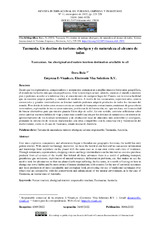Mostrar el registro sencillo del ítem
Tasmania. Un destino de turismo aborigen y de naturaleza al alcance de todos
| dc.contributor.author | Ruiz, Dora | |
| dc.date.accessioned | 2022-09-02T10:30:52Z | |
| dc.date.available | 2022-09-02T10:30:52Z | |
| dc.date.issued | 2022 | |
| dc.identifier.issn | 2530-7134 | |
| dc.identifier.uri | http://hdl.handle.net/10396/23814 | |
| dc.description.abstract | Desde que los exploradores, conquistadores y aventureros comenzaron a ampliar nuestros horizontes geográficos, el mundo no ha hecho más que empequeñecerse. Con la tecnología actual, además, tenemos el mundo a nuestros pies y podemos acceder a la información y al conocimiento de cualquier lugar del Planeta con la misma facilidad que en nuestros propios pueblos y ciudades de residencia. A través de los restaurantes, supermercados, centros comerciales y grandes intermediarios en Internet también podemos adquirir productos de todos los rincones del mundo. Pero detrás de todos estos avances existe un mundo de transporte contaminante, emisiones de gases efecto invernadero, explotación de los recursos naturales, problemas de deforestación, etc. que nos hace ver la necesidad de buscar alternativas para que nuestro planeta Tierra deje de sufrir. En este sentido, conviene reflexionar sobre cómo cambiar nuestros hábitos de viaje y tener más sensibilización por los destinos de naturaleza con sistemas de aprovechamiento de los recursos territoriales y de producción local de alimentos más sostenibles y ecológicos, primando la utilización de técnicas tradicionales con otras compatibles con la conservación y valorización del medio natural, como es el caso de Tasmania, estado insular de Australia. | es_ES |
| dc.description.abstract | Ever since explorers, conquerors, and adventurers began to broaden our geographic horizons, the world has only gotten smaller. With current technology, moreover, we have the world at our feet and we can access information and knowledge from anywhere on the planet with the same ease as in our own towns and cities of residence. Through restaurants, supermarkets, shopping centers and large intermediaries on the Internet we can also purchase products from all corners of the world. But behind all these advances there is a world of polluting transport, greenhouse gas emissions, exploitation of natural resources, deforestation problems, etc. that makes us see the need to look for alternatives so that our planet Earth stops suffering. In this sense, it is worth reflecting on how to change our travel habits and be more aware of nature destinations with systems for the use of territorial resources and local production of more sustainable and ecological food, prioritizing the use of traditional techniques over others that are compatible. with the conservation and enhancement of the natural environment, as is the case of Tasmania, an insular state of Australia. | es_ES |
| dc.format.mimetype | application/pdf | es_ES |
| dc.language.iso | spa | es_ES |
| dc.publisher | UCOPress | es_ES |
| dc.rights | https://creativecommons.org/licenses/by-nc/4.0/ | es_ES |
| dc.source | Revista Internacional de Turismo, Empresa y Territorio (RITUREM) 6(1), 225-228 (2022) | es_ES |
| dc.subject | Turismo de naturaleza | es_ES |
| dc.subject | Turismo aborigen | es_ES |
| dc.subject | Turismo responsable | es_ES |
| dc.subject | Tasmania (Australia) | es_ES |
| dc.subject | Nature tourism | es_ES |
| dc.subject | Aboriginal tourism | es_ES |
| dc.subject | Responsable tourism | es_ES |
| dc.subject | Tasmanian (Australia) | es_ES |
| dc.title | Tasmania. Un destino de turismo aborigen y de naturaleza al alcance de todos | es_ES |
| dc.title.alternative | Tasmanian. An aboriginal and nature tourism destination available to all | es_ES |
| dc.type | info:eu-repo/semantics/article | es_ES |
| dc.relation.publisherversion | http://www.uco.es/ucopress/ojs/index.php/riturem/index | es_ES |
| dc.rights.accessRights | info:eu-repo/semantics/openAccess | es_ES |

